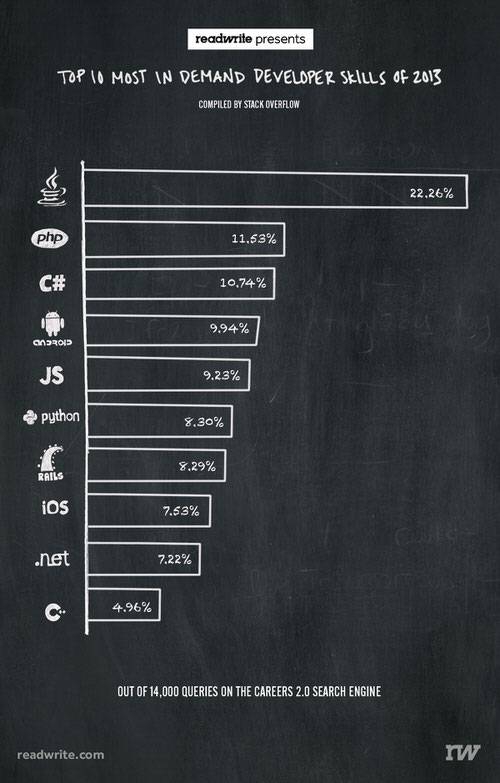If you’re a Java developer, chances are you did pretty well for yourself in 2013.
At least, that’s according to statistics from Stack Overflow. Thousands of companies use the website’s Careers 2.0 search in order to find job applicants with specific developer skills each year. In 2013 Java took the lead as the most frequently searched skill keyword.
See also: The Most In-Demand Job Skills Of 2013
Stack Overflow tallied up which keywords companies searched for the most often out of 14,000 total searches, and gave us the numbers to do an infographic of the top ten most-searched skills:

According to Will Cole, Product Manager for Careers 2.0 at Stack Overflow, Java’s popularity may indicate employers’ rising interest in mobile development. But due to the language’s wide number of development uses, it’s no surprise it snagged first place.
“Java is hugely popular for a wide variety of companies, it’s the most common language across the world that developers use and are proficient at, and it’s relevant knowledge for a growing market in Android development,” said Cole. “Love it or hate it, many people know Java, and many companies want those developers.”
Stack Overflow isn’t isolated in putting Java on top. According a survey by Dice, a technology career center, employers listed Java as the number-one developer skill they’d be seeking out over the course of 2013. Likewise, ReadWrite also predicted that Java would be one of the seven most in-demand technology skills for the upcoming year.
According to job search site Indeed, demand for Java developers has remained steady for nearly a decade. Android development, which often utilizes Java, is currently Indeed’s fourth most popular trending skill (as well as Stack Overflow’s fourth most searched keyword).
Indeed, most of the skills on the Stack Overflow chart have been around for a long time. There’s no Hadoop, Node.js, or any other buzzword skill in the top ten.
What should job seeking developers take from this? Trendy skills and languages may come and go, but employers are still boosting for the classics.
“While we see new technologies pop up frequently, it takes a considerable amount of time for them to work their way into the every day company’s stack on a mass scale to notice major trend changes,” Cole said.
Photo by Flickr user Ed Yourdon, CC 2.0
Update, 4:30pm PT:An earlier version of the infographic in this story presented the StackOverflow data in a confusing and conceptually problematic fashion. It has been updated.

















